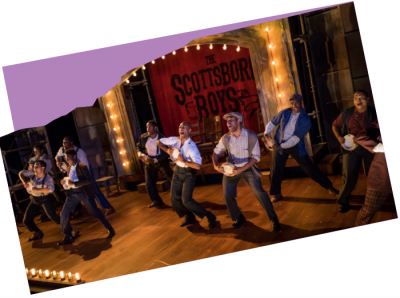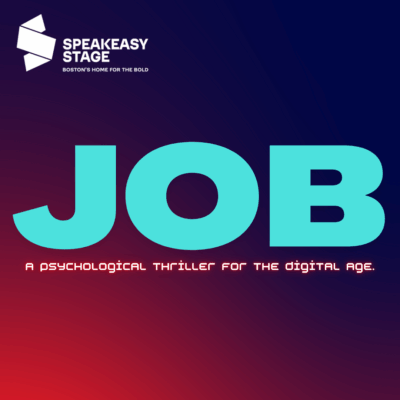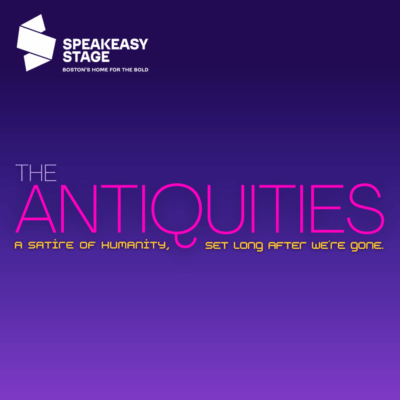Your donation sets the stage for a new season of Boston's most intimate, entertaining and provocative plays and musicals. Our shows make powerful connections with our audiences-- and they are only possible because of you.
Double Duty
Double Duty

Marvelyn McFarlane: Double Duty
You’ve done a lot of work in the Boston area. Where did you grow up and how did you get involved in theatre here?
I grew up in a little town called, Lehigh Acres in Southwest Florida, where almost all of my performing was done for church or in school. With no real art scene or public transportation I got out of Lehigh and came to Massachusetts to attend Eastern Nazarene College, where I met actor, director, and playwright, Jacqui Parker, who came to direct one of our productions. Jacqui then cast me in my first Boston show, The Trial of One Short-Sighted Black Woman vs. Mammy Louise and Safreeta Mae, and became my mentor through workshops and shows we did as part of the African American Theatre Festival. From there I was able to work with Company One, The Huntington, and Wheelock Family Theatre.
Do you have any artists or theatre people in your family?
I’m an only child and I grew up listening to my father singing old hymns and my mother reciting poetry, but overall, my very Caribbean family is extremely theatrical, talented, and large! I honestly don’t even know the number of family members I have who are “professionally” in the arts because I have 19 aunts and uncles, and hundreds of cousins, some of whom I still haven’t met. I do know of a few writers, poets, recording artist, dancers, and models. Trust and believe that whenever my mother’s side of the family gets together there is always some impromptu talent show that usually ends in a group number!
You’ve been working on children’s musicals in South Korea. Tell us how that came about. What was the experience like?
Working in South Korea was the best job I’ve ever had! I heard about Geyonggi English Village from one of my college friends who is half Korean. English Village is a government funded, English-immersion theme park where kids and families can practice conversational English by going to various stations like music, baking, the post office, the bank etc. About 14 English-speaking performers are hired to spend a year writing and performing original ESL musicals. I wrote and directed my first musical there and ended up staying for two years because I loved it so much. It was nice to not only get paid a decent salary to do something I enjoyed, but I got to travel to India, Thailand, and Japan while I was there, just for kicks.
Clybourne Park playwright Bruce Norris wrote that the actors from the first act, set in 1959, play different characters in the second act, set 50 years later. How did you approach playing two characters in the same play?
Clybourne Park is essentially two separate shows that happen to have shared lines, sentiments, and family connections that all have to do with the house and neighborhood. Before rehearsal officially started, I got together with DeLance Minefee, who plays my husband in both acts, and we discussed things like how our characters met, the names of our children, what we fight about, and also all the similarities and differences between the couples due to their education, finances, and relationship to the communities they live and work in.
Francine and Lena, the characters you play in acts one and two respectively, have a lot that is different about them, thanks to the 50 years separating the acts. What do they have in common? How do you think they would regard each other?
I definitely think Francine would tell Lena she should keep her answers short and shut up! Lena would in turn say to Francine you better speak up and take the floor while you have it! Neither woman could come out and say how they really felt in the beginning. Neither woman wanted to be accused of saying the “wrong thing”. For Francine, it was out of fear of saying the something that could endanger herself or her family, for Lena she wasn’t given the opportunity to speak and when she is, tries to keep it as generic as possible, hoping her audience will somehow understand what she is trying to say with out her having to just come out and say it.
Have you had a chance to see A Raisin in the Sun at the Huntington?
I saw Raisin and was completely blown away. I’d read the play and seen the movie numerous times, but this was the first time seeing it on stage and it was like I was hearing the story for the first time. The set, lighting, and music are amazing, and the cast is extremely talented, but all I could think of was how ballsy director Liesl Tommy was in her directorial choices! I was so proud of my people up there. It was brilliant!
There’s a lot of humor in this play when discussing very serious issues. What effect do you think that has on the conversation?
This play is so tumultuous it would just be plain cruel to not allow you to laugh! We are guilty of making you so uncomfortable at times because we go from the blatantly offensive where you can laugh at how ridiculous a character is being, to those subtle statements you start to laugh at but then realize, “Oh wait, I’ve thought or said that as well and it’s actually offensive to so-and-so over there.” [Playwright] Bruce [Norris] lets you laugh but he doesn’t let you off the hook.
 Past Productions
Past Productions Primary Trust
Primary Trust Lizard Boy: A NEW MUSICAL
Lizard Boy: A NEW MUSICAL JOB
JOB The Antiquities
The Antiquities Swept Away
Swept Away




